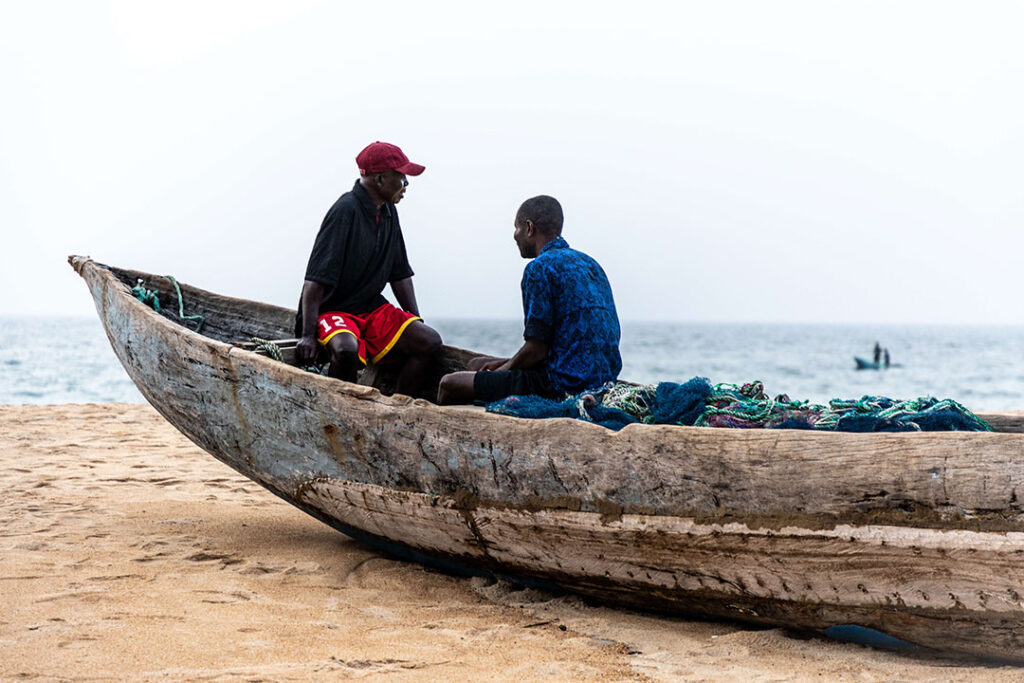ADF STAFF
The sight of 50-meter-long trawlers has become increasingly common at the port in Monrovia, Liberia. The arrival of six such Chinese-owned vessels in June stoked fears among artisanal fishermen of a further depletion of precious fish stocks.
Chinese trawlers have fished West African waters for years, robbing locals of food and income. In Liberia, roughly 37,000 people work full or part time in the fishing industry, and 80% of the population relies on fish for protein.
But the supertrawlers are larger than any fishing vessels ever seen in Liberia and use more sophisticated equipment to track fish and elude authorities. Supertrawlers catch fish by dragging enormous nets behind them. Some nets are more than a kilometer long and catch hundreds of tons of fish a day.
Many Liberians make their living fishing out of wooden canoes.
Because Chinese permits allowing the vessels to fish outside China’s economic exclusion zone expired, the supertrawlers are not yet licensed by Liberia’s government. Jerry Blamo, president of the Liberia Artisanal Fishermen’s Association, hopes they never will be.
Liberia’s National Fisheries and Aquaculture Authority (NaFAA) should “respect Liberian law and protect the interests of local coastal communities and our shared marine environment,” Blamo said in a joint statement with the Environmental Justice Foundation (EJF). “Our waters support local jobs and provide good quality food, but granting these massive supertrawlers fishing licenses would destroy that.”
Supertrawlers are notorious for mistreating onboard workers, depleting local fish stocks, and sabotaging efforts of local artisanal fishermen in Liberia and other West African countries.
Experts say such trawlers often try to avoid legal penalties by using deception, such as underreporting a ship’s fishing capacity so they can rake in larger hauls.
One reason why illegal fishermen are successful in Liberia is that the country doesn’t have the capacity to properly police its waters, and its efforts to do so are “hugely donor-driven,” Steve Trent, executive director of the EJF, said in an email to ADF.
“Liberia currently has one patrol vessel, which lacks off-shore capabilities and a skilled crew,” Trent said. “However, [the EJF] has recently embarked on a project which may help. The ‘Communities for Fisheries’ project focuses on ‘co-management,’ where fishing communities and government authorities work together to eradicate illegal fishing and secure sustainable fisheries.
“Under the project, local people will be given the skills and equipment to collect evidence, such as taking good quality, geotagged photos of trawlers fishing illegally. This will allow them to create an effective line of defense for Liberia’s fish populations. Once this evidence is collated, the government will be able to effectively prosecute the perpetrators, deterring illegal fishing in the future.”
Additional help comes from the Sea Shepherd Conservation Society, with which Liberian authorities partnered in 2017. The global nonprofit organization also works to combat fishing and other maritime crimes in Benin, Gabon, The Gambia and Ghana.
Sea Shepherd and the Liberian Coast Guard have arrested people from 15 vessels on illegal fishing charges, and Sea Shepherd has one ship helping patrol Liberian waters, Capt. Peter Hammarstedt, the nonprofit’s director of campaigns, told ADF in an email.
In Liberia, depleted fish stocks — including sardinella, marlin, sea bream, drums or croakers, and marine catfish — have mostly recovered after the government prohibited industrial trawlers from fishing in a 6-nautical-mile zone in 2010. But the government recently reduced the prohibitive zone by about half for some vessels, which could let larger boats fish in areas now designated for artisanal fishermen and reverse the gains in fish stocks seen after the 2010 restrictions.
Despite the potential of supertrawlers to deplete valuable fish stocks in Liberia and around the Gulf of Guinea, Liberian Fisheries officials said the Chinese vessels may be granted commercial fishing licenses once they get the proper approval from China. Six Chinese bottom trawlers are currently licensed in Liberia. They are smaller than supertrawlers, but their weighted nets drag the sea floor, displacing aquatic species and mixing pollutants into their food chain. Their indiscriminate catches can quickly deplete stocks.
Once the supertrawlers get Chinese approval, Liberia would issue a “trial license for one or two vessels” for two to three months “for demersal trawling only” to determine their catch rates, Emma Metieh Glassco, director general of the NaFAA, said in a story on chinadialogue.net. Demersal trawling nets move at or just above the ocean floor.

